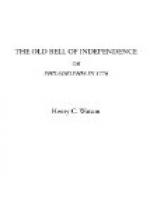“It was a sight such as all men are not permitted to see,” said Morton.
“It was grand—it was sublime!” exclaimed Mr. Jackson Harmar. “A scene worthy of any pen or any pencil!” As Mr. Jackson Harmar seized all such opportunities for exercising his literary propensities, it was most probable that he considered that the pen alone could do justice to the scene, and that his pen was destined to immortalize it.
The bell now rang for tea, and the party adjourned to the tea-table, where, however, the conversation turned upon matters foreign to the Revolution. Mrs. Harmar would introduce household concerns when her husband began to allude to the war, and the children, especially Thomas Jefferson Harmar, would play around the old veterans, asking them trifling questions, until the meal was finished, and then Morton, Higgins, Smith, and Wilson prepared to return to their respective residences. Morton lived in the interior of Pennsylvania, and was stopping with a near relative during his visit to the city. The other three resided in New Jersey, and were putting up at the same house—that of a friend of Higgins’. Old Harmar shook hands with his old camp associates, wishing them many days of health and happiness to come, and trusting that they might meet again before death should claim them. The veterans kissed the children, and Morton gave Thomas Jefferson Harmar a bullet from Bunker’s Hill, telling him to learn what his countrymen had fought and bled for, and to act like them on a like occasion, if any such should ever occur, which he earnestly hoped would never be the case. Mr. Jackson Harmar procured a carriage, and the veterans being soon comfortably seated, he accompanied them to their respective residences. On bidding him farewell, the aged patriots thanked him for his kindness, which Mr. Jackson Harmar returned with an elaborate panegyric on the men of the Revolution, and the duty of his generation to treat them with the highest veneration and respect. The public either suffered from or were benefited by the interview between Mr. Jackson Harmar and the veteran patriots, for the press soon teemed with stirring poetical appeals to the people to hold their liberties dearer than life, on account of the blood that they had cost. A large volume also appeared, entitled “Legends of the Times that tried Men’s Souls,” beginning with the history of the “Old State-House Bell.”
THE END.



